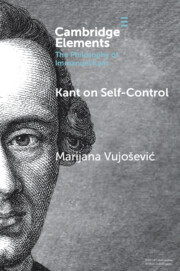Element contents
Kant on Self-Control
Published online by Cambridge University Press: 28 May 2024
Summary
Information
- Type
- Element
- Information
- Online ISBN: 9781108885232Publisher: Cambridge University PressPrint publication: 20 June 2024
References
Primary Sources
Secondary Sources
Accessibility standard: Unknown
Why this information is here
This section outlines the accessibility features of this content - including support for screen readers, full keyboard navigation and high-contrast display options. This may not be relevant for you.Accessibility Information
- 10
- Cited by
